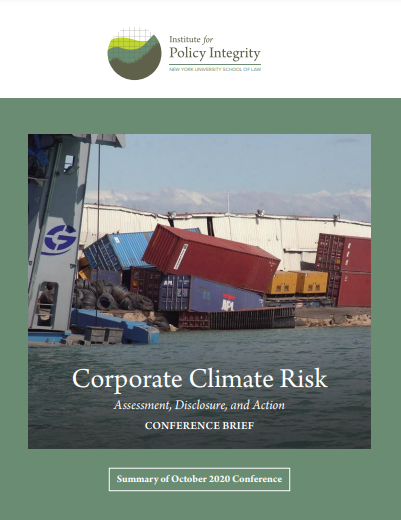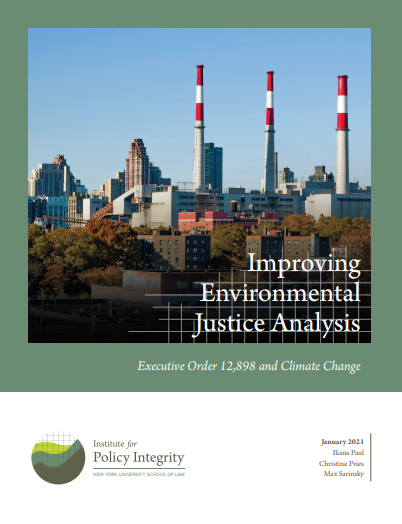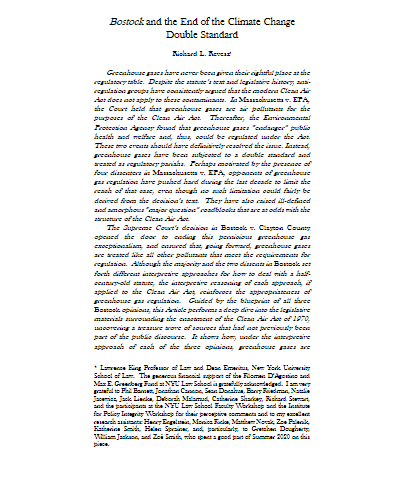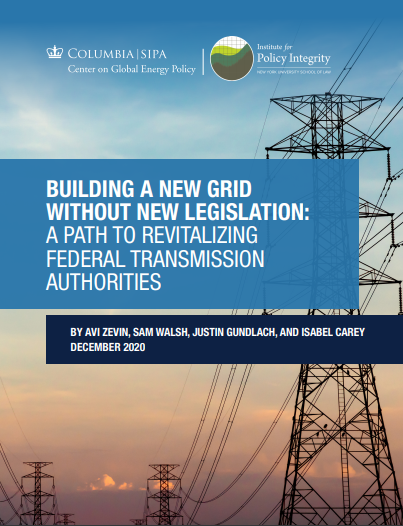-
Corporate Climate Risk: Assessment, Disclosure, and Action
Conference Brief
On October 2, 2020, the Institute for Policy Integrity and the Volatility and Risk Institute at NYU Stern School of Business convened a conference bringing together investors, companies, researchers, and regulators to discuss climate-related financial risks and identify opportunities to better assess, report, and act on them. This brief summarizes some of the major points of discussion from the conference, which featured different perspectives on various policy, economic, and legal issues.
-
Improving Environmental Justice Analysis
Executive Order 12,898 and Climate Change
Distributional and equity concerns have typically received short shrift in federal administrative decisionmaking, particularly with regard to actions with climate-change impacts. This report aims to aid advocates and policymakers in meaningfully addressing the disparate climate impacts of federal actions.
-
Comments to NHTSA on Delay of CAFE Penalties Increase
The National Highway Traffic Safety Administration's interim final rule delays the application of its 2016 inflation adjustment of the penalty for violating the corpoate average fuel-economy (CAFE) standards. We submitted comments explaining that the rule is untimely under the Inflation Adjustment Act, whose deadlines to amend the intial catch-up inflation adjustment expired years ago.
-
Amicus Brief on the SAFE Rule
We filed an amicus brief explaining how NHTSA and EPA's decision to finalize a rule that, even under their own analysis, will be net-costly to society, is arbitrary and capricious.
-
Bostock and the End of the Climate Change Double Standard
Guided by the blueprint of all three Bostock opinions, this article, published in the Columbia Journal of Environmental Law, performs a deep dive into the legislative materials surrounding the enactment of the Clean Air Act of 1970, uncovering a treasure trove of sources that had not previously been part of the public discourse. It shows how, under the interpretive approach of each of the three opinions, greenhouse gases are unquestionably pollutants for the purposes of the Clean Air Act. Because the approaches in the majority and dissents in Bostock—and thus a majority of the current Court—all point in the same direction, the era of greenhouse gas exceptionalism should now be over.
-
Federal Court Voids Trump’s Counterproductive ACE Rule
The U.S. Court of Appeals for the D.C. Circuit unanimously struck down the Trump administration’s toothless replacement of the Obama-era Clean Power Plan, which sought to reduce greenhouse gas emissions from the nation’s power sector. Richard Revesz and Dr. Burçin Ünel’s article on energy storage and greenhouse gas emissions was cited in the court’s opinion.
-
Comments on OCC’s Fair Access Financial Services Rule
The Office of the Comptroller of the Currency (OCC) proposed a rule that would preclude banks from taking climate risks into account when making decisions regarding the provision of financial services. We submitted joint comments explaining how OCC fails to consider or justify serious costs imposed by the rule. Climate risks pose a significant threat to the economic and operational health of firms in the energy sector and to the stability of the financial system as a whole.
-
Comments to EPA on Cross-State Air Pollution Rule
Our comments on the Revised Cross-State Air Pollution Rule Update for the 2008 Ozone NAAQS identify critical flaws in the proposal's design and regulatory impact analysis. The Environmental Protection Agency's (EPA) unreasonably low valuation of climate effects also contributes to its selection of an inefficient policy alternative. We submitted joint comments detailing how EPA's flawed analysis harms public health and the environment.
-
Building a New Grid Without New Legislation
A Path to Revitalizing Federal Transmission Authorities
In the absence of legislation, critical long-distance transmission can be developed by applying existing federal legal authorities. A number of important regulatory and commercial measures have been proposed, including streamlining transmission planning, upgrading existing transmission system components, putting transmission lines underground, and using existing rights-of-way from highways and railroads. Even if these solutions are adopted, however, state siting requirements may prove an important obstacle to developing an efficient, national transmission grid. So, this paper examines legal authorities already available to the Department of Energy and the Federal Energy Regulatory Commission to develop the interstate transmission capacity crucial to the energy transition.
-
Amicus Brief in D.C. Circuit on Methane Limits for Oil and Gas Sector
The Environmental Protection Agency (EPA) recently finalized revisions to New Source Performance Standards for methane and volatile organic compound (VOC) emissions from the oil and natural gas sector. We filed an amicus brief in the U.S. Court of Appeals for the D.C. Circuit, focusing on EPA's flawed legal and economic justifications for the rule.
Viewing recent projects in Climate and Energy Policy










